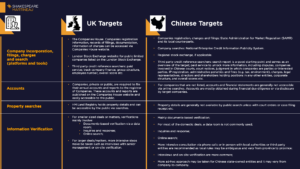One of the most common queries received from Chinese companies is about the legal due diligence process in the UK. These queries mainly arise when:
- Companies are preparing for its IPO in mainland China and the legal position of its UK subsidiaries often form part of the overall legal opinion required by Chinese authorities;
- Companies are acquiring a UK company;
- Companies are planning long-term cooperation with UK distributors on substantial commercial agreements which pose questions on the capacity of this UK entity.
One of the most fundamental questions which is often overlooked is – is a legal due diligence report actually needed?
Do I need a legal due diligence report?
The answer to this question differs depending on the nature of the transaction.
IPO
A due diligence report may not be needed in the IPO scenario, although in practice questions may arise as to the formal requirement of this document. Is it more of a legal opinion or a legal due diligence report? If the focus is on what it is called in Chinese and translated directly into English, then legal opinion would be the right term. However, legal opinions under English law and practice play a different role and carry different levels of responsibility for English lawyers. A legal opinion issued by English lawyers will typically exclude confirmation on facts and will not take on responsibility for investigating and verifying the accuracy of the facts. A legal due diligence report, however, is a summary of the findings of the facts, risks and advice. Perhaps, before bringing the queries to English lawyers the best approach would be to look beyond what the document is called, dissect the requirements set by Chinese authorities (e.g. China Securities Regulatory Commission) and be clear whether expression an of facts is needed.
Cross-border commercial contracting
The initial question may be – would it be of more benefit to have a legal memorandum giving detailed advice on specific areas of English law and regulations. Would having this help my business plans? If it is uncertain whether the plans would work, or which route should be taken due to unfamiliarity with local laws and regulations, the first thing to do is to assess the feasibility of the plans, to find out legal restrictions and risks, and the correct solutions to overcome these hurdles. Only when these issues are identified and addressed, then comes the assessment of capacity and credibility of local partners, be they agents or distributors. Identifying the needs and stages throughout the process is crucial. It may be that needs change as the plan develops, the focus may change and what is required will be different – the legal service however, is exactly the same. Not asking the right questions can often result is a broad and inefficient project management exercise.
Acquisition
When acquiring a company, legal due diligence is a standard practice even in smaller deals and is particularly recommended in cross-border acquisition deals. A legal due diligence report will be one of the main transaction documents. Regardless of the type of corporate transaction, due diligence is a critical process to ensure informed decision-making and minimise risks. The depth and focus of due diligence may vary based on the specific transaction type but by understanding the unique considerations for each type of transaction, businesses can navigate the due diligence process effectively, leading to more successful outcomes and enhanced value creation.
Different approaches and practices
Having looked at the need for and necessity of due diligence reports, there are different approaches and practices in mainland China and the UK when carrying out those due diligence investigations.
Should I worry about foreign investment restrictions in the UK?
Yes and no. In terms of merger control, the UK Enterprise Act 2002 sets out the procedures of Phase 1 and Phase 2 merger inquiry by the Competition and Markets Authority, although the Enterprise Act focuses on competition, media plurality, financial stability and public health emergency considerations. Unlike in China, there is no standalone foreign investment regime or an overarching foreign investment act currently operating in the UK. In respect of foreign direct investment, one typical example is that it is much easier for Chinese individuals or companies to set up subsidiaries in the UK and acquiring UK entities is subject to fewer restrictions in terms of screening on foreign investors – no pre-approval or record-filing procedures with much less paper work and shorter processing time. However, there are tell-tale signs that the tides are turning on both the UK and mainland China, with the National Security and Investment Act 2021 (NSI) coming into force in the UK as of 4 January 2022 and the Foreign Investment Act taking effect in mainland China from 1 January 2020. The former aims at upgrading the intervention to a boarder range of M&A transactions and the latter intends to level the playing field for both foreign and domestic investors. It is particularly alarming that to date, five proposed acquisitions of UK assets or entities by Chinese based investors have been prohibited under the NSI, involving mainly ‘military and dual-use’, ‘defence’, ‘energy’ sectors. Depending on circumstances, for example the types of the deals, qualifying sectors etc, the implications of the NSI may become a pressing issue and an earlier and more in-depth due diligence for this purpose may become necessary.
Below is a brief comparison of legal due diligence in the UK and in China
For Chinese stakeholders investing or doing business in the UK, understanding how things work in the UK and what resources are available is the key. This will help manage expectations and timescales, project planning, engaging with the right advisors at different stages and ultimately, companies are more likely to make sensible business decisions. Some aspects of legal due diligence in the UK may come as a surprise for Chinese investors but this need not be a stress. Here is a brief summary of what to watch out for.
Key take-aways for Chinese stakeholders doing business in the UK
Professional advisors play a pivotal role even in small or mid-sized private acquisitions in the UK and are engaged in the early stages of the transaction. The rule of ‘caveat emptor’ (let the buyer beware) is deeply embedded in society which means that buyers are generally cautious of what they are purchasing and would actively engage professionals to look after their interests and have thorough review on targets; corporate transactions are more streamlined and fast paced which is to be expected by the UK-based entities. The professional advisor sector is highly developed and regulated. Businesses and individuals are used to relying on them to put deals together seamlessly. Chinese investors, particularly private and fast growth regional companies, were not born to have advisors by their sides and need to adjust their mindset when planning their UK entry and investment. Laws and regulations are clearer, more consistent, transparent and predictable in the UK and the gap between law and its application in reality is much narrower. In China, the reality between what the law says and how it is applied in practice is vastly different. In-depth consultation directly with local authorities or officers is good practices in mainland China when carrying out due diligence. In the UK, this approach may not be necessary and again, most stakeholders tend to rely on experienced advisors’ investigation and advice. Independent credit reference providers in the UK are likely to provide limited coverage and provide less information on a target entity with higher costs, whereas when searching Chinese based companies, much more information can be accessed using Chinese providers with more competitive fees. Areas like ESG, data protection, cyber security, sanctions carry more significance in the UK than in mainland China and parties should pay particular attention to these. The ongoing implications of Brexit and the changes to rules and regulations must not be overlooked.







